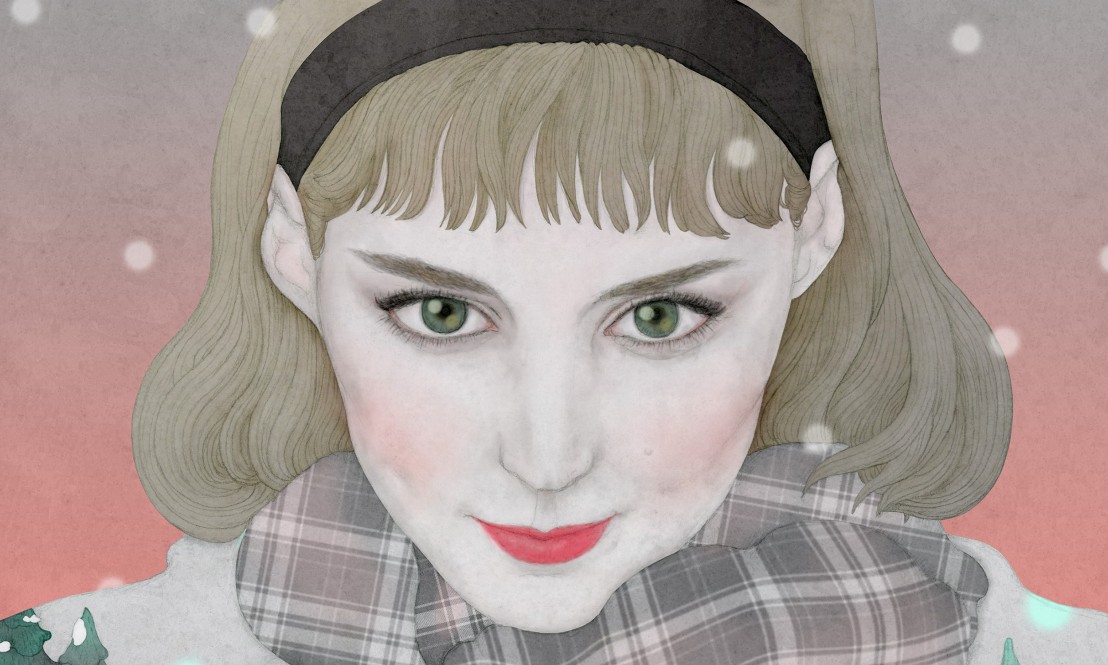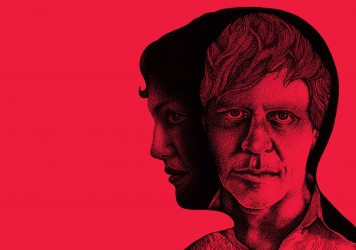
The Carol star tells us how she has managed to pack so much into her short career.
Like a stolen glance between unacquainted lovers, fate had a hand in the defining chapter of Rooney Mara’s story. When Carol first called back in 2011, Mara was faced with an agonising decision, one she looks back on with mixed feelings. “As much as I adored the script, I couldn’t say yes,” she confesses. “I needed time to live life a little bit before I could jump into another part.” Such was the situation in which Mara found herself after David Fincher’s The Girl with the Dragon Tattoo, for which she worked 12 to 16 hour days over the course of a year (by comparison, Carol was shot in two months).
It’s unusual to hear an actor talk openly about the come down, although it stands to reason that switching off after immersing yourself in a character like Lisbeth Salander should be a long and painful process. “There was a long period after Dragon Tattoo where I couldn’t imagine myself in anything,” she reflects. “I was so exhausted. Emotionally, physically, I was completely drained. I would read things and I just couldn’t see myself in the part. I felt like I didn’t have anything left to give. I thought I would be bad.”
By the time the conversation came back around to Carol, now with both Cate Blanchett and director Todd Haynes attached, Mara was ready. “I hadn’t worked in almost a year,” she recalls, “so I was really hungry to do something. It was an easy decision. Looking back, I can’t quite believe I ever said no. It just seems so crazy to me, because Cate is one of my favourite actors. I’ve looked up to her since… I can’t even remember how long. The fact that I turned down a chance to work with her is absurd to me now. But that’s acting. The choices I make so often depend on the head space I’m in.”
If Blanchett’s strong onscreen persona and classical elegance mark her as the Katharine Hepburn of her generation, then Mara is Louise Brooks – cool and exotic in an effortless, strangely accessible kind of way, a 21st-century ‘It’ girl dropped in from the Jazz Age. Just like the mercurial silent era icon, Mara was born into affluence (her great-grandfathers Art and Tim founded the Pittsburgh Steelers and New York Giants respectively) but had a fairly normal upbringing. A relative latecomer to acting, she found her way into the movies in her early twenties via a handful of bit-part roles, before returning to college in New York where she graduated from Gallatin in 2010. And like Brooks, Mara is known for playing impulsive, sharp, sexual (but never submissive or promiscuous) women. Her performances, too, often fall somewhere between ethereal and naturalistic. There’s a preciseness about her, from the way she moves and speaks – softly, always with purpose – to the subtle gestures through which she’s able to convey a character’s deepest thoughts and emotions. “Flung out of space” is how Blanchett’s eponymous socialite so memorably describes Mara’s Therese; a line that could just as easily have been written about the actor herself.
Read more in LWLies 62: the Carol issue
Buy the magWith the exception of the Aaron Sorkin-scripted The Social Network, which required Mara to “talk a mile a minute and squeeze seven pages into four minutes,” every film she has appeared in this decade – from Dragon Tattoo to David Lowery’s Ain’t Them Bodies Saints to Carol – has seen Mara consciously embody the minimalist mantra ‘less is more’. She’s always looking to exploit the space between words, savouring the quiet moments that can have a lasting impact on the viewer. “I think you can convey a lot through silence,” she says. “I’ve always been drawn to actors who are really good at that – Marion Cotillard is someone I could watch do anything, she just exudes so much feeling and emotion in everything she does. I could watch her doing laundry and it would be interesting. With Carol, the script already had those moments, but it’s something I try to bring to every part I play. Emoting through silence is something that comes very naturally to me.”
Back in May, Mara received the Best Actress award at the 68th Cannes Film Festival for Carol, and in September was presented with one of three Silver Medallion Awards at the Telluride Film Festival (the other two going to director Danny Boyle and documentarian Adam Curtis). At 30, Mara is one of the youngest recipients of the latter award, which is given to artists deemed to have made a significant contribution to the world of cinema. If bestowing what is effectively a lifetime achievement award upon someone who got their acting break five years ago seems like a superficial gesture, Mara is equally quick to downplay the importance of such accolades. It’s not that she isn’t grateful, more that she measures success differently. “Any time you receive an award is a huge honour,” she says. “But even the award in Cannes, which was something I did not expect at all, I probably felt really good about myself for about a day and then the next day I was back to being me, with the same goals and same hang-ups. Awards are great, but they don’t make me feel like suddenly I’ve arrived.”
From speaking to Mara it’s clear that the mantelpiece of her Los Angeles home doesn’t represent the limit of her ambitions, but when LWLies enquires about her career aspirations she makes no attempt to hide her insecurities. “I still feel like I have so much left to do and so many more mistakes to make and so much more to prove,” she says, rushing her words. “I always feel like I’m just trying to not fuck up. I’m terrified of being bad. Every movie I finish I think, ‘Shit, now I know how to do it better.’ That’s kind of what keeps me going.” Perhaps what’s most surprising about hearing Mara speak with this level of humility is how genuine it feels. Excessive modesty can seem false and insincere when expressed by someone whose talent and charm is as undeniable as her’s, yet if anything this candid admission serves as a reminder of how far Mara’s star has risen in such a short space of time.
“I don’t have a process. I mean, I like to do a lot of reading and research for each part, but I find that stuff so boring to talk about. Like, who wants to hear about that, really?”
In past interviews Mara has described acting as an education, a continuous process of experiential learning in which personal development and professional compatibility are intrinsically linked. This was never more true than on Carol. “I learned so much working on this film,” she tells LWLies. “Just observing Cate and how she works… I don’t want to get too fangirly here, but I was in awe a lot of the time around her.” And Todd? “Every filmmaker I’ve worked with has been so different to the next, and I’ve learned something different from all of them, but Todd… he’s just incredible. He’s so well prepared and pays so much attention to every detail. You know sometimes you watch movies and it feels like the actors are all in a different movie? With Todd, he makes it so clear what movie you’re going to be in and the space you’re going to be in. At the end of the day, as an actor you’re ultimately at the mercy of the director. I felt very safe in Todd’s world.”
When asked about her own process, Mara baulks. “I don’t have a process. I mean, I like to do a lot of research and reading for each part, but I find that stuff so boring to talk about. Like, who wants to hear about that, really?” It’s a perfectly fair shutdown, but at this point you begin to wonder to what extent Mara has earned her reputation for being coy and guarded in interviews. Then, with her very next breath, she derails that train of thought. “I find it very hard to be vulnerable, even in front of the people that I love. With Todd, he made it very easy. Therese is a very vulnerable character and Todd created a space where I felt comfortable showing that side of myself, which is something I’d never normally feel. You wanted to do that for him.” So what is it precisely about Haynes’ approach to storytelling that resonated with Mara? “He just understands women,” she explains. “I don’t understand it – he’s just so brilliant at telling female stories. Because he loves and respects women so much it created a safe environment for us to tell a really intimate and delicate story. It would have been a very different experience with someone who isn’t as sensitive and in-tune as Todd.”
It’s fascinating that Mara is so keen to discuss Haynes’ method above her own, not least because self-aggrandising conversations about “the craft” are so common when engaging with Hollywood’s elite, but mostly because it’s rare to meet such an unaffected young actor, someone who recognises the need to adapt to a given director’s process. This understanding is part of what makes Mara a great actor, and presumably it’s been a factor in her finding favour with the likes of David Fincher, Steven Soderbergh and Terrence Malick, whose as yet untitled 2016 project is currently in post production.
Like a lot of actors, Mara is her own worst critic and a stickler for detail, but because so much of what she does is instinctual she doesn’t see the benefit in retrospectively obsessing over her work. (As Jesse Eisenberg says to Mara in The Social Network, “There’s a difference between being obsessed and being motivated.”) “I always watch myself back at least once,” she reveals, “but usually just out of respect for the filmmaker. Before the Cannes premiere [of Carol], Todd had been trying to get me to watch the film for six months and I kept putting it off. It’s one of those things where you end up noticing all the little flaws and mistakes that probably no one else notices but seem huge to me. It’s like, I have a teeny-tiny snaggletooth that sticks out a little bit, which to me is a flaw. But there’s always two ways of looking at things, and so I’ve learned to acknowledge the fact that it also gives my face character. Now I love my little snaggletooth.”
You won’t see Mara play the ingénue or the innocent narrator, or any outmoded female archetype for that matter. She simply has no interest in playing those types of characters. Yet while Mara has undoubtedly come a long way in the last five years, the same can’t quite be said of the industry. It’s a problem she’s acutely aware of. “When I was starting out it was really frustrating because it felt like all the parts out there were ‘the girlfriend’ or whatever. There was no real person behind most of those characters. In the last five years that’s changed and I’ve had the opportunity to play a range of well-realised characters. But a lot of the time it feels like I’m reading the best female dialogue out there. There have been years where there’s been nothing that’s interested me. You get scripts through and the dialogue is just horrible. It’s so weird. People just don’t know how to write female dialogue. So many men are afraid of writing female dialogue. We’re not that different, you know, we’re all human. But it’s changing. There are a lot more female writers and I sincerely hope that there will be a lot more female directors in the future as well. The fact that we’re even having this conversation, that’s a start.”
Carol is released in the UK 27 November.
Published 17 Nov 2015

From Brief Encounter to his upcoming Peggy Lee biopic, the Carol director muses on a variety of subjects.

Pick up our latest issue and fall in love with Todd Haynes’ breathtaking period romance.